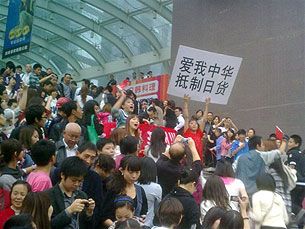




HONG KONG—Chinese police have moved in to halt anti-Japanese protests over a territorial dispute as Japan's Prime Minister Naoto Kan called on Beijing to guarantee the safety of Japanese companies and citizens.
The latest in three days of consecutive nationwide protests on Oct. 18 came in response to Japan's detention last month of a Chinese fishing boat captain near a disputed group of islands in the East China Sea.
Official media reports said that authorities had dispatched around 1,000 armed police to the central Chinese city of Wuhan after a fresh march against Japanese goods in a busy downtown area. The police detained a number of "trouble-makers."
Carrying banners reading "Against government buying Japanese goods" and "Japanese cars are shoddily made," around 100 protesters left their rallying point in Wuhan's Luxiang Square in the early afternoon. However, netizens said from the scene that protests were still visible on the streets as night fell.
"There were a lot of protesters," said an employee who answered the phone at a hotel along the marchers' route. "There were also a lot of police and armed police."
"This made it hard to move around, and there were traffic jams in a lot of places," the employee said. "There are still a lot of them, but they started to disperse at around 7 p.m."
A Wuhan resident surnamed Li confirmed that large numbers of people were on the streets.
"Yes, there really are a lot of people here," he said. "A lot of roads are blocked to traffic now ... They are still blocked."
Japanese Prime Minister Kan has called the protests “regrettable” while the Chinese government described the anti-Japanese sentiment as “understandable," even as it called on the public to express their outrage in a rational way, news agencies reported.
Kan told parliament that the Japanese government "has expressed its regret over the demonstrations against Japan," adding that Tokyo has asked "that Japanese nationals and companies be protected."
Sichuan protests
